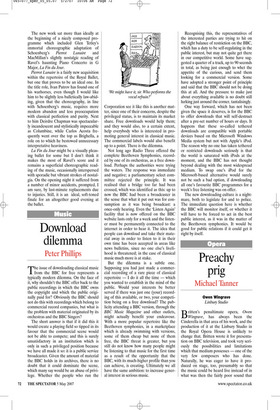Download dilemma
Peter Phillips
The issue of downloading classical music from the BBC for free represents a typically modern dilemma. On the face of it, why shouldn’t the BBC offer back to the public recordings in which the BBC owns the copyright and which the public originally paid for? Obviously the BBC should not do this with recordings which belong to commercial record companies, but what is the problem with material originated by its orchestras and the BBC Singers?
The short answer is that if it did this it would create a playing field so tipped in its favour that the commercial scene would not be able to compete; and this is surely unsatisfactory in an institution which is only in such a privileged position because we have all made it so: it is a public service broadcaster. Given the amount of material the BBC holds in its archives, there is no doubt that it could dominate the scene, which many say would be an abuse of privilege. Whether the people who run the Corporation see it like this is another matter, since one of their concerns, despite the privileged status, is to maintain its market share. Free downloads would help them; and they would also, to a certain extent, help everybody who is interested in promoting general interest in classical music. The commercial labels would also benefit up to a point. There is the dilemma.
Not long ago Radio Three offered the complete Beethoven Symphonies, recorded by one of its orchestras, as a free download. Perhaps the authorities were trying the waters. The response was immediate and negative; a parliamentary select committee rejected the principle. It was realised that a bridge too far had been crossed, which was identified as this: up to now the BBC had been a broadcaster in the sense that what it put out was for consumption as it was being broadcast: a once-only hearing. Even the ‘Listen Again’ facility that is now offered on the BBC website lasts only for a week and the listener must be permanently connected to the internet in order to hear it. The idea that people can download and take their material away in order to listen to it in their own time has been accepted in areas like news bulletins, since no one else’s livelihood is threatened; in the case of classical music much more is at stake.
But the dilemma is a subtle one. Supposing you had just made a commercial recording of a rare piece of classical repertoire — I do it all the time — which you wanted to establish in the mind of the public. Would your interests be better served if there was just one (your) recording of this available, or two, your competition being on a free download? The publicity attending a BBC version, through the BBC Music Magazine and other outlets, might actually benefit your endeavour. With a more popular repertoire like the Beethoven symphonies, in a marketplace which is already swimming with versions, some of them cheap but none of them free, the BBC threat is greater, but you still do not know how many people might be listening to that music for the first time as a result of the opportunity that the BBC, with its much-higher profile than you can achieve, is creating. Ultimately we all have the same ambition: to increase general interest in serious music. Recognising this, the representatives of the interested parties are trying to hit on the right balance of restriction on the BBC, which has a duty to be self-regulating in the public interest, but may not quite get there in our competitive world. Some have suggested a quarter of a track, up to 90 seconds in total, as being just enough to whet the appetite of the curious, and send them looking for a commercial version. Some have adopted a stronger point of principle and said that the BBC should not be doing this at all. And the pressure to make just about everything available is no doubt still lurking just around the corner, tantalisingly.
One way forward, which has not been given the space it deserves, is for the BBC to offer downloads that will self-destruct after a pre-set number of hours or days. It happens that these so-called tethered downloads are compatible with portable devices based on the Microsoft Windows Media system but not with Apple’s iPod. The reason why no one has taken tethered or restricted downloads seriously is that the world is saturated with iPods at the moment, and the BBC has not thought beyond dealing with the most widespread medium. To swap one’s iPod for the Microsoft-based alternative would surely not be such a bad option, if downloading all one’s favourite BBC programmes for a week’s free listening was on offer.
The new downloading culture is a nightmare, both to legislate for and to police. The immediate question here is whether the BBC will monitor itself, or whether it will have to be forced to act in the best public interest, as it was in the matter of the Beethoven symphonies. It would be good for public relations if it could get it right by itself.


































































































 Previous page
Previous page